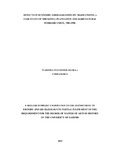| dc.description.abstract | This study endeavored to assess the effects of economic liberalization on trade
unionism in Kenya, with the specific reference to the Kenya Plantation and
Agricultural Workers‟ Union (KPAWU). It interrogated the effectiveness of the
leadership responses to the effects of economic liberalization and revealed that it was
unsatisfactory to many workers owing to a number of leadership challenges. The
study was based on Karl Marx‟s Labour Theory of Surplus Value which posits that
capitalists exploit workers‟ surplus value to accumulate profits. Marx suggests that
workers organize themselves into trade unions for self-emancipation by struggling for
higher wages. Because the theory confines union activities to pecuniary struggles
only, Moral and Ethical Theory of trade unionism was used to supplement Marx‟s
theory by engendering other union concerns that are not financial in nature.
The study used of both primary and secondary data. The secondary sources were
supplemented with oral interviews using unstructured questionnaire as well as the use
of archival sources. The purposive and snow ball techniques were used in identifying
the informants. The data obtained were qualitatively analyzed. The study established
that economic liberalization had calamitous effects on the plantation workers. Under
the auspices of economic liberalization, workers were rendered jobless through
practices such as deskilling, introduction of machinery and redundancy. Moreover,
the government reduced its expenditure on health and education, locking out the
plantation workers from obtaining quality health services, and their children deprived
of post primary education. The government‟s legislations on minimum wages denied
the plantation workers better pay hence impoverished them. Similarly, the currency
devaluation skyrocketed inflation rendering the prices of basic commodities
unaffordable to plantation workers. The plantation workers, through their union,
KPAWU, responded to these ignoble effects of economic liberalization by engaging
in industrial action, seeking legal protection through Collective Bargaining
Agreements (CBA) and retraining workers.
Since this study was conducted among the plantation workers in three counties only,
further research should be done to include all the plantation workers in order to
generalize the findings of this study. | en_US |

